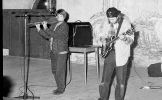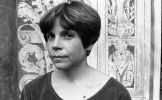The duo featuring David Dramm on electric guitar and Ann La Berge on an amplified, electronic flute has developed a high-intensity improvised style of music which combines the trashing rhytms of post-punk styles with the formal elegance of minimalism. Layered with the experimental tuning and virtuoso extended techniques, this is a music which leaves conventional musical boundaries in the dust. Both musicians/composers perform regularly with different avantgarde ensambles in Europe and the USA. They have toured with other musicians in Bohemia (České Budějovice, Brno, Ostrava, Prague) and they played in Plasy on the 26th of June in the refectory.
Anne La Berge (born 1955 in Palo Alto, California) is a flutist, composer and improviser, currently resident in Amsterdam. Her performances bring together a virtuosic command of her instrument, a penchant for improvising microtonal textures and melodies, and an array of percussive flute effects, all combined with electronic processing. These have distinguished her as “a pioneer in a wide array of new techniques.” She is known for her use of texts that form part of her compositions and improvisations. In addition to creating her own work, she regularly performs in other artists’ projects in a range of settings from modern chamber music to improvised electronic music. She was pursuing PhD research at the University of California, San Diego in the mid-1980s and moved to Amsterdam in 1989, where she has lived ever since.
David Dramm (born 1961, Illinois) grew up in San Diego, California. His composition studies began with Robert Erickson at University of California, San Diego and later continued at Yale University with Louis Andriessen and Earle Brown. His music is performed regularly in international concert halls, festivals and clubs as well as being used by choreographers and theater makers throughout Europe. The international press has dubbed him an ‘American iconoclast.’ The Dutch press describe his music as ‘the ground-breaking terrain between Charles Ives, Jimi Hendrix and Lou Reed.’ His omnivorous vocal music output led the newspaper Trouw to recently proclaim him ‘The King of Song.’


